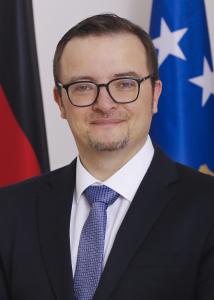For this year’s edition of the Regional Security School KAS invited experts, politicians and representatives of civil society, as well as students from North Macedonia, Serbia and Bulgaria to discuss international and local security challenges with a special focus on urban security.
The event was opened with welcoming addresses by the Official Representative of the Konrad Adenauer Foundation in North Macedonia, Daniel Braun, who emphasized the importance of regional cooperation because the war threats and (natural) disasters that challenge the local security do not stop at any border. Further welcoming remarks were given by Theo Larue representing the Wilfried Martens Centre for European Studies in Brussels and Ratko Duev and Marjan Gjurovski from the Faculty of Philosophy at Ss. Cyril and Methodius University in Skopje.
The working part started with a session addressing the challenges and experiences of the local self-government in coping with local security threats, where the mayor of the Municipality of Strumica, Kostadin Kostadinov, and the mayor of the Municipality of Novo Selo, Gjogje Bozhinov, (gave valuable insights in…) talked about some practical examples of challenges regarding local and urban security their municipalities are confronted with, the procedures of how they address these issues and the capacities their municipalities have at their disposal/possess. Their explanations were followed by a large number of questions from the participants.
In the second session of the afternoon on “Preventive urban security and resilience – challenges for the national security” Prof. Oliver Bakreski from the Faculty of Philosophy at Ss. Cyril and Methodius University in Skopje gave an overview on the key topics and problematic areas that will challenge and influence urban and national security in the future, followed by Prof. Sergei Cvetkovski from the Faculty of Philosophy at Ss. Cyril and Methodius University in Skopje, who provided some information about the theoretical background of the prevention of urban security and the concept of Civil Defense. After that Sait Saiti, Secretary General of the Macedonian Red Cross gave some valuable insights into the practical perspective on security challenges and crisis management and how the Red Cross can contribute to urban security. (And again the session was closed by a round of questions from the participants.)
The second day started with a presentation on international security challenges and their influence on urban security, where Daniel Shunter, expert in Foreign and Security Policies and editor-in-chief of the web portal balkansc.net described how the challenges and problems are directly influencing the region providing some practical examples from the countries in Southeastern Europe. This was followed by a presentation of Todor Tagarev, Head of Centre for Security and Defence Management at the Bulgarian Academy of Science and former Bulgarian Defence Minister on a more theoretical approach about the aims and purposes of war, as well as its targets and the role of critical infrastructure.
The second day continued with a Workshop led by Prof. Stefan Surlic, from the Faculty of Political Studies at the University of Belgrade and Prof. Marjan Gjurovski from the Faculty of Philosophy - Skopje, where the participants were encouraged to develop strategies and solutions for certain unsolved conflicts in the Balkan region together in small groups.
In the afternoon the group was invited to observe a large scale emergency response demonstration exercise organized by the local branch of the Red Cross in Strumica in cooperation with the local fire department showing the process of evacuation, high angle rescue, first aid care of the injured and rescue of trapped persons. Afterwards the group went on a cultural-historical excursion visiting the monasteries Vodocha and Veljusa in the surrounding region and ended the day with a joint dinner.
The last day of the Regional School started with a session on protection of critical infrastructure with a special focus on possibilities for regional and/or cross border cooperation. Gjorgji Alchevski, from the Faculty of Philosophy at Ss. Cyril and Methodius University in Skopje and Director of the Ohrid Airport emphasized the importance of the protection of critical infrastructure for national security and safety of the citizens and explained the difference between the targets of terroristic attacks and how to recognize potential threats and the procedures of how to respond in case of an attack. After that Robert Mikac, from the Faculty of Political Science at the University of Zagreb gave the participants some insight into cyber crisis management and provided some practical examples of private critical infrastructure companies facing those kinds of attacks and how they deal with the challenge.
The event ended with a presentation of the ideas for solving some of the region’s most demanding conflicts and challenges that the groups developed during the Workshop on the second day covering the internal conflict in Bosnia-Herzegovina, the identity dispute between Bulgaria and North Macedonia and the challenge of integrating (especially Roma) minorities into society. In the end Marjan Gjurovski, from the Faculty of Philosophy at Ss. Cyril and Methodius University in Skopje and Daniela Popovska from the Konrad Adenauer Foundation in North Macedonia finished the event with some concluding remarks emphasizing the importance of bringing together young students and experts from the region bearing in mind the many regional disputes and offering them a platform for exchange and cooperation in order to break prejudices.




